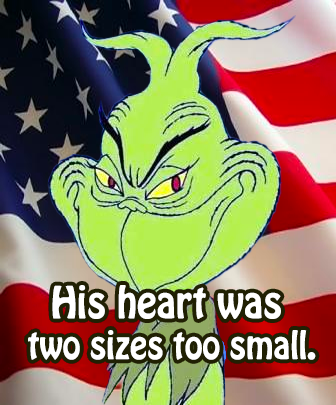Democracy is like Santa Claus. It only exists if we believe it does. Many Americans would like to say, “Yes Virginia, there was a legitimate election.” But the Scrooges are saying, “Bah, humbug.”
A number of Americans believe that the election was stolen. One poll reports that half of Republicans believe Trump “rightfully won” the election. Another poll found that 62% of Republicans say it’s “very likely” that the election was stolen by Democrats.
This means that when Joe Biden is inaugurated, many will view him as a shopping mall Santa, sitting on a throne of lies.
We are at a dangerous crossroads. If what the president says is true, the Democrats have stolen our republic. If what the president says if false, then he is the Grinch hijacking our democracy.
It is difficult to tell how serious this is. It is one thing to say you don’t believe in Santa. It is another thing to stop celebrating Christmas.
We’ll see how this cookie crumbles after the Electoral College votes and someone is inaugurated. Will the nonbelievers choose to act on their disbelief? If so, let’s hope that their actions are nonviolent. To protest non-violently is the nonbelievers right, grounded in the First Amendment. But violence is extra-constitutional and revolutionary.
Nonbelievers might stop paying taxes, for example. Of course, tax resisters will be prosecuted. But that is the point. Nonviolent protesters go to jail to protest a corrupt system.
I am not advocating this. I happen to believe the state election officials, the courts, and other experts who concluded that the election was legitimate. But this whole system is based upon faith.
Like Christmas, democracy is a ritual and a pageant. At some point we make a leap of faith and choose to play along. People have a right to stop playing along. But there are consequences.
One famous defense of playing along begins by saying, “Yes, Virginia, there is a Santa Claus.” Francis P. Church said that Virginia and her 8-year-old friends had been “affected by the skepticism of a skeptical age.” He defended the importance of “childlike faith” in magic, poetry, fantasy and romance.
Government also involves fantasy and faith. A flag is a piece of cloth. A law is merely words on a page. These things come alive when we believe in them.
Francis Church wrote that the best things are those we cannot see. He spoke of Santa Claus as a metaphor for the hidden wonders of the world — for love and beauty, meaning and transcendence.
He could as well have been talking about democracy. Like Christmas, democracy exists in the minds of men and women. It only exists when we play along. When people stop playing along, the fantasy ends. If enough people stop playing along, the whole thing collapses.
Perhaps skepticism is warranted in this skeptical age. We know that there really is no Santa Claus. And as the partisans squabble, it is increasingly difficult to believe in the idea of America. Maybe it is time to wake up from the dream of e pluribus unum.
But it’s worth asking what we would wake up to, if we stopped playing along. If we give up on the dream of democracy, what would replace it? If we stop believing in America, then what?
Christmas is a good time to think about what we believe.
Do we believe in country more than party?
Do we have faith in democracy or not?
Christmas is also a time of transformation.
After the Grinch stole Christmas, he was surprised. The Grinch thought that if he stole the tree and the presents, the Whos of Whoville would have nothing to celebrate. But they came together and sang anyway. And the Grinch’s heart grew.
The Grinch learned that Christmas doesn’t come from a store. He learned that Christmas “means a little bit more.”
When we wake up from this nightmare winter, will we learn something similar?
The future looks bleak. But this is also a season of hope.
So let’s hope that if there are protests, they remain nonviolent.
Let’s hope that we can sing in harmony again.
And let’s hope that the Scrooges and Grinches will decide to play along.


